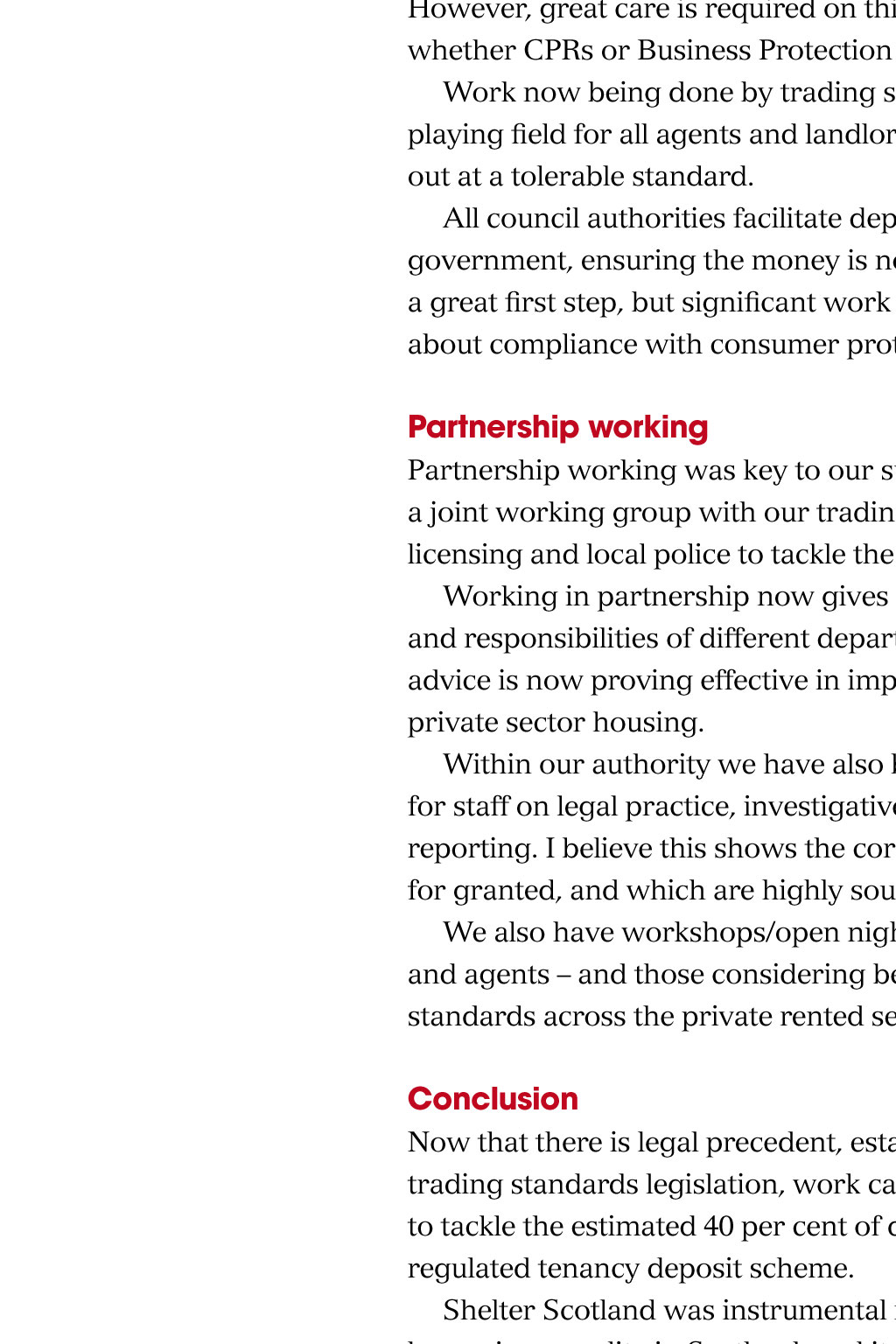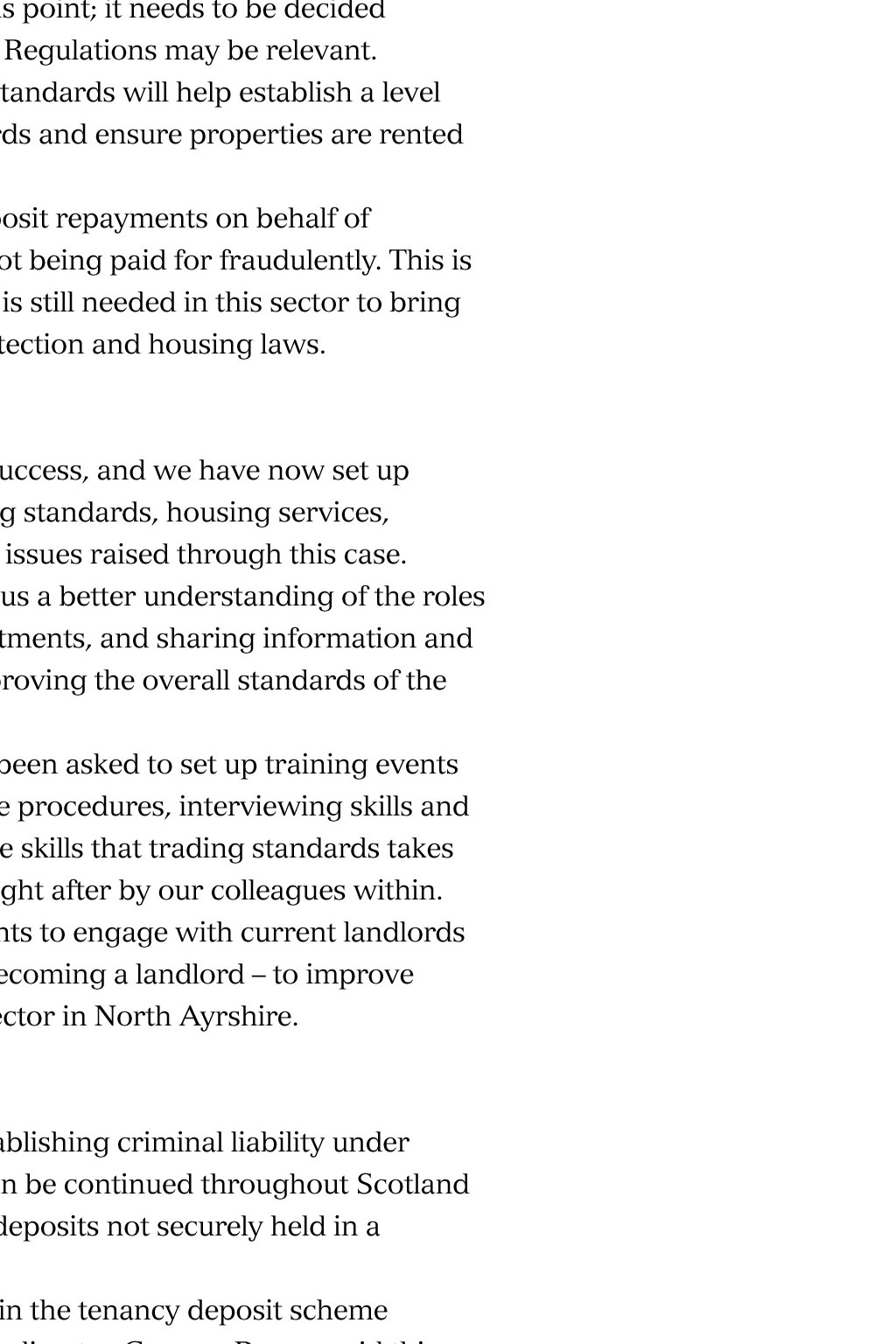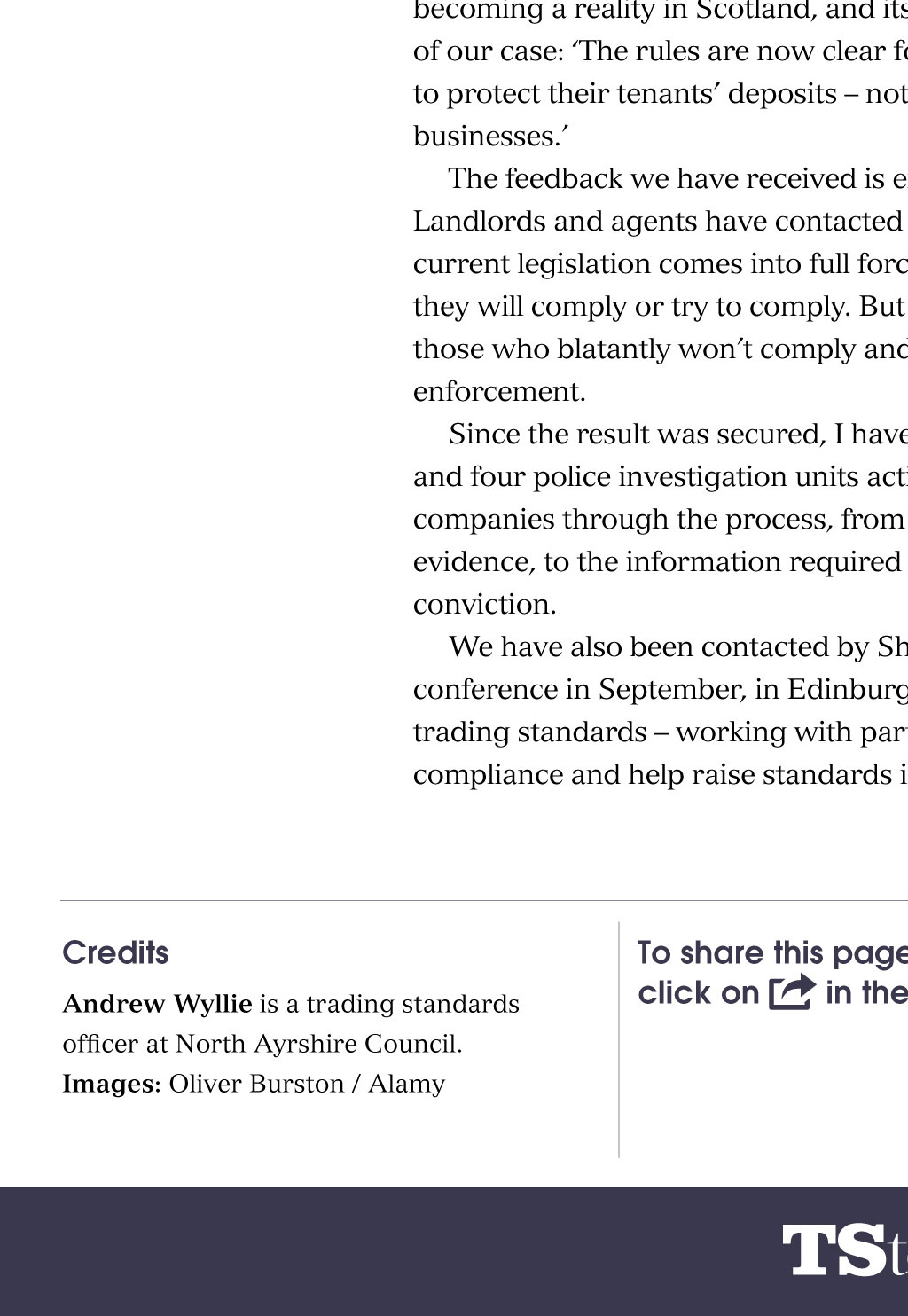




























North Ayrshire lettings prosecution: Colvin Houston In this feature unsecured deposits CPRs legal compliance Strength in numbers Collaboration between North Ayrshires trading standards and housing teams has increased protection for tenants and made Scottish legal history. Andrew Wyllie explains F or the rst time in Scottish history, a letting agent has been successfully prosecuted in a criminal court for failing to secure tenancy deposits as required under regulations introduced ve years ago and the feat is largely thanks to North Ayrshire Trading Standards expertise. Our knowledge of various trading standards powers which our housing team didnt have access to ultimately persuaded the courts to identify landlords as consumers for the rst time under Scottish law, setting a precedent for other local authorities trying to improve conditions for tenants. By working in partnership with our housing team, we were able to use the Consumer Protection from Unfair Trading Regulations 2008 (CPRs) in a criminal court to deal with the failure of a letting agent Colvin Houston to secure tenancy deposits in one of the three approved schemes regulated under The Tenancy Deposit Schemes (Scotland) Regulations 2011. Under these regulations, tenants only have a civil remedy as a source of redress, and the onus is solely on the landlord to ensure the deposits are secure. Before trading standards intervention, our housing team was unable to take any legal action against Colvin Houston as it had no powers to seek compliance. Housing legislation places responsibility for securing deposits on landlords only. However, using CPRs enabled us to hold a letting agent responsible for deposits taken on behalf of accidental landlords that is, individuals who have inherited property that they are then unable to sell, and hence rent out. As this issue has not been seen as a core trading standards concern in the past, this case has ramications for services across the country; with the current landscape of trading standards in Scotland currently uncertain, we were keen to show how we can work with partners and showcase how our investigative skills and various powers can be used for the greater good of consumer protection. The case It was late in 2014 when our housing department colleagues rst knocked on our door, after receiving various complaints from tenants about their housing situation. Problems included letting agents and landlords failing to: secure deposits in one of the three approved schemes under The Tenancy Deposit Schemes (Scotland) Regulations 2011; issue paperwork stating what tenants rights were; offer paperwork with specic information about charges; and carry out ongoing repairs, serious repair work or address damp. North Ayrshires housing team led the case but, lacking the experience and skills required, it really needed a partner that could help establish areas of concern and give access to various powers to help it protect consumers. So, we decided to work together, conducting joint visits to local letting agents and landlords in an attempt to improve housing standards and tenants rights by offering advice and guidance. It was our belief that, when a landlord uses an agent, it should be the agents responsibility to advise landlords about bringing their properties up to tolerable standards before letting the property out. However, in reality, agents felt that if they didnt take the property on in its current condition, another agent would. We realised that visible action was required, forcing agents to work to the same standard across the board, which would also act as a shot across the bows to let them know this sector is being actively enforced. THE WIDER PICTURE: POLICE PROBE ORGANIS E D CRIME LINK During our investigation several issues This investigation is still ongoing. houses of multiple occupancies, which were raised that went far beyond our Further issues established from our were not registered as such and not up to the legal standards required. remit. From working together and work on this project include: false invoices sharing intelligence with our partners, issued for works being carried out; the Police Specialist Crime Unit is now properties not meeting the tolerable now produced a standard document investigating the potential of serious standard; and non-compliance for visiting tenants to accumulate organised crime in an unrelated case. with Energy Performance Certificate information, which will help both housing This was discovered through partnership (EPC), electric safety and Gas Safety services and trading standards provide working, and affected a wider area requirements. a robust enforcement regime to ensure We also discovered a major issue with than just North Ayrshire. As a result of this project, we have housing standards are met. During our investigation, we found we were coming up against one agent time and again Colvin Houston for failing to secure tenant deposits. In the end, we were able to use two landlord statements and evidence that showed the accused had used one of the deposits schemes in the past proving the company had prior knowledge of the requirements to secure a guilty plea from the rm. This evidence was easily established using housing services direct access to the deposit scheme. It can also be obtained by writing a DPA letter requesting such details from each of the holding schemes. The two landlords statements conrmed that, as far as they were concerned, the accused was dealing with the property management including making sure the deposits were secured in a nominated deposit scheme. In this instance, a Regulation 3 offence under the CPRs was deemed appropriate. The CPRs dene professional diligence as: The standard of special skill and care which a trader may reasonably be expected to exercise towards consumers. After seeking advice from the Procurator Fiscal, we agreed to lay sample charges under the CPRs. These related to two specic deposits, amounting to 925, which had not been paid into a required tenancy deposit scheme. The court case, at Kilmarnock Sheriff Court, lasted four months and, in the end, Colvin Houston pleaded guilty to engaging in a commercial practice that contravenes the requirements of professional diligence by failing to pay tenants deposits into a statutory tenancy deposit scheme, as required by the Tenancy Deposit Schemes (Scotland) Regulations 2011. The rm was ned 750 reduced to 500 for an early plea on 19 June 2016. Work now being done by trading standards will help establish a level playing field for all agents and landlords and ensure properties are rented out at a tolerable standard Legal significance What is the legal signicance of this case? Vulnerable tenants can become trapped in below-tolerable-standard housing, unable to move because the landlord or letting agent fails to return their deposit. Housing legislation offers only a civil action for tenants whose deposits are not secured. Civil action is expensive and stressful, leaving some tenants so distressed because of a temporary relationship or mental health breakdown, that they have neither the mental nor nancial capacity to pursue a civil case. They are no longer alone trading standards can take action against landlords and letting agents to ensure deposits are secured, and that tenants can access a free, less-stressful alternative dispute resolution scheme to recover their cash. The housing legislation requires landlords to be t and proper and places a civil duty on them to secure tenants deposits. Unlike in England, there is no control over letting agents in Scotland. This case held that, where a landlord is legally regarded as a consumer by becoming an accidental landlord letting a single property due to relationship breakdown or the death of a relative, and therefore forced to rent that property out the letting agent is committing a criminal offence under the CPRs. This issue went to legal debate in court prior to the plea, and the Procurator Fiscal was greatly assisted by Jason Freeman, director of consumer law from the Competition and Markets Authority (CMA), who argued that accidental landlords were, in fact, consumers. Cases which proved useful during legal argument include Heifer International Inc. v Christiansen [2008] Bus LR D49 at para 250, and the Ofce of Fair Trading v Foxtons Ltd [2009] EWHC 1681 (Ch), which was very relevant in proving landlords could also be classed as consumers. However, great care is required on this point; it needs to be decided whether CPRs or Business Protection Regulations may be relevant. Work now being done by trading standards will help establish a level playing eld for all agents and landlords and ensure properties are rented out at a tolerable standard. All council authorities facilitate deposit repayments on behalf of government, ensuring the money is not being paid for fraudulently. This is a great rst step, but signicant work is still needed in this sector to bring about compliance with consumer protection and housing laws. Partnership working Partnership working was key to our success, and we have now set up a joint working group with our trading standards, housing services, licensing and local police to tackle the issues raised through this case. Working in partnership now gives us a better understanding of the roles and responsibilities of different departments, and sharing information and advice is now proving effective in improving the overall standards of the private sector housing. Within our authority we have also been asked to set up training events for staff on legal practice, investigative procedures, interviewing skills and reporting. I believe this shows the core skills that trading standards takes for granted, and which are highly sought after by our colleagues within. We also have workshops/open nights to engage with current landlords and agents and those considering becoming a landlord to improve standards across the private rented sector in North Ayrshire. Conclusion Now that there is legal precedent, establishing criminal liability under trading standards legislation, work can be continued throughout Scotland to tackle the estimated 40 per cent of deposits not securely held in a regulated tenancy deposit scheme. Shelter Scotland was instrumental in the tenancy deposit scheme becoming a reality in Scotland, and its director Graeme Brown said this of our case: The rules are now clear for letting agents in that they have to protect their tenants deposits not use them as a cash-ow for their businesses. The feedback we have received is encouraging to say the least. Landlords and agents have contacted us to say well done and, when current legislation comes into full force early in 2018, the majority have said they will comply or try to comply. But frustration still remains concerning those who blatantly wont comply and because of a perceived lack of enforcement. Since the result was secured, I have guided nine local authorities and four police investigation units actively investigating individuals or companies through the process, from initial investigation of collecting evidence, to the information required by the Procurator Fiscal to secure a conviction. We have also been contacted by Shelter and asked to attend its conference in September, in Edinburgh, to carry out a workshop on how trading standards working with partner agencies can achieve legal compliance and help raise standards in the private housing sector. Credits Andrew Wyllie is a trading standards ofcer at North Ayrshire Council. Images: Oliver Burston / Alamy To share this page, in the toolbar click on You might also like Faster food action June 2016